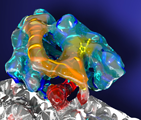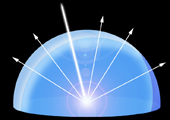


Qualified staff are encouraged to apply for the jobs below, or forward to others who might be interested. Go here to see a full listing of open positions.
Administrative Assistant 3 (Earth Sciences) Reporting to the Division Proposal Development-Strategic Initiatives Manager, the incumbent will provide a comprehensive range of administrative services and support.
Bioinformatics Analyst 2/3 (Genomics) Analysis of data related to genomic projects with a strong emphasis on whole-genome-shotgun-assembly and associated problems.
Division Director (Chemical Sciences) Guide Division to be a central driving force within the Lab and be an impetus for growth of fundamental chemical sciences research.
Administrative Services Supervisor (Chemical Sciences) Support the Director and Division Office regarding key operational areas encompassing administration, business practices, and project management.
Health Physics Team Manager (EH&S) Provide programmatic and technical management and leadership to the operational health physicists and radiation physicists in the Radiation Protection Group.
 People: Five Lab Researchers Named to National Academy of Engineering
People: Five Lab Researchers Named to National Academy of Engineering Earth scientist Lisa Alvarez-Cohen, materials scientists Eugene Haller and Xiang Zhang, physical bioscientist and Deputy Lab Director Jay Keasling, and energy efficiency veteran Art Rosenfeld are among the 68 new members elected to the National Academy of Engineering (NAE). Academy membership honors those who have made outstanding contributions to "engineering research, practice, or education and to the pioneering of new and developing fields of technology." More>
 Research: Life’s Cargo Carrier of the Cells Moves Like a Seesaw
Research: Life’s Cargo Carrier of the Cells Moves Like a SeesawLife’s smallest motor, a protein that shuttles cargo within cells and helps cells divide, does so by rocking up and down like a seesaw, according to research conducted by scientists at Berkeley Lab and Brandeis University. The researchers created high-resolution snapshots of a protein motor, called kinesin, as it walked along a microtubule, which are tube-shaped structures that form a cell’s "skeleton." The result is the closest look yet at the structural changes kinesin proteins undergo as they ferry molecules within cells. More>
 This is an exciting and challenging time for the Lab with significant growth and growth potential in a number of our critical research areas. One daunting challenge is finding space for these new and expanding initiatives. The Lab Director has appointed a Lab Space Manager and Space Planning Advisory Committee. Their task is to recommend actions to meet the Lab's space needs. SPAC's first order of business is developing ways to meet the need for 500 additional work spaces and approximately 20,000 square feet of additional laboratory space. This significant expansion will affect all at the Lab and all SPAC members are committed to come up with solutions that provide productive work spaces, limit disruption as much as possible, and keep costs down. All options will be considered and SPAC will need input from all at the Lab for ideas and suggestions.
This is an exciting and challenging time for the Lab with significant growth and growth potential in a number of our critical research areas. One daunting challenge is finding space for these new and expanding initiatives. The Lab Director has appointed a Lab Space Manager and Space Planning Advisory Committee. Their task is to recommend actions to meet the Lab's space needs. SPAC's first order of business is developing ways to meet the need for 500 additional work spaces and approximately 20,000 square feet of additional laboratory space. This significant expansion will affect all at the Lab and all SPAC members are committed to come up with solutions that provide productive work spaces, limit disruption as much as possible, and keep costs down. All options will be considered and SPAC will need input from all at the Lab for ideas and suggestions.
Take a moment to consider the following questions and come to the brown bag meeting today at noon in the Building 50 Auditorium with your ideas and input:
1. What do you need with respect to office space to work effectively?
2. Have you seen or experienced this at other organizations?
3. What do you think the Lab should do to address our space problem (500 additional workstations and approximately 20,000 sf of additional lab space over the next 24 months)? More>
 In 2008 Martin Janecek of the Life Sciences Division designed a novel instrument for measuring how light is reflected inside a scintillating crystal. The data collected allowed him to model the performance of scintillator-based radiation detectors more accurately than current state-of-the-art programs. Last month Janecek was notified that his model has been incorporated into the latest release of the powerful GEANT4 computational toolkit. GEANT, which stands for Geometry and Tracking, was originally developed at CERN for simulating the passage of particles through matter for high-energy physics but has found wide use in numerous other scientific applications, including nuclear medicine.
In 2008 Martin Janecek of the Life Sciences Division designed a novel instrument for measuring how light is reflected inside a scintillating crystal. The data collected allowed him to model the performance of scintillator-based radiation detectors more accurately than current state-of-the-art programs. Last month Janecek was notified that his model has been incorporated into the latest release of the powerful GEANT4 computational toolkit. GEANT, which stands for Geometry and Tracking, was originally developed at CERN for simulating the passage of particles through matter for high-energy physics but has found wide use in numerous other scientific applications, including nuclear medicine.
 Employee Development : Caregiver Stress Workshop Next Week, Counseling Sessions March 4
Employee Development : Caregiver Stress Workshop Next Week, Counseling Sessions March 4 UC Berkeley’s Care Services will present a workshop on "Caregiver Stress and Success" at the Lab on Wednesday, Feb. 24, from 11:30 a.m. to 12:30 p.m. in Perseverance Hall (Bldg. 54-130B). The workshop will explore the stressors associated with elder care and provide strategies for changing negative thinking, getting assistance and support in making difficult care-giving decisions, and finding valuable resources. Registration is required (BLI0108). On Thursday, March 4, an elder care counselor will be onsite from 1 to 4 p.m. offering three one-hour sessions for individuals. Call 643-7754 for an appointment, first–come, first-served.
Today at Berkeley Lab encourges comments, suggestions, and story ideas. Please send them here.
TABL is produced by Public Affairs' Communications Group